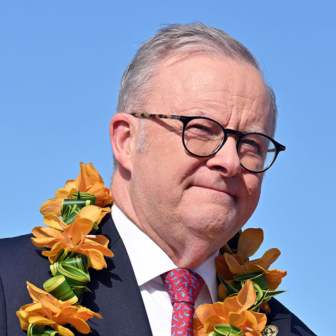At the polling booth in Cambodia’s Takhmao town, Oun Sreymao’s expression contrasts with her bright patterned pyjamas, popular among Cambodian women. She had voted just minutes after prime minister Hun Sen, surrounded by the frantic flash of cameras, dipped his finger in indelible ink to show that he had cast his own vote.
“I came here to vote because I have no choice,” Sreymao tells us. At last year’s local elections — widely seen as a litmus test for the national poll — she voted for the opposition Cambodia National Rescue Party, or CNRP. Now, she says, she’s lost hope. “We want change, but we cannot make it. So I just go with the flow, let it be.”
Hun Sen has ruled Cambodia with an increasingly heavy hand for thirty-three years, and no one in Cambodia expected his supremacy to come to an end at yesterday’s election. Victory for the ruling Cambodian People’s Party, or CPP, had been a forgone conclusion ever since a compliant court dissolved its only legitimate challenger, the CNRP. Opposition leader Kem Sokha had already been arrested on charges of treason, and has been incarcerated for almost a year in a remote prison near the Vietnamese border.
With most of the minor parties receiving tiny shares of the vote — they are often called “fireflies,” because they flicker briefly (and suspiciously) just before an important vote — the CPP will make a clean sweep of Cambodia’s parliament. Its super majority will cement the growing perception of Cambodia as a de facto one-party state.
For CPP spokesman Sok Eysan, the result is “extraordinary… as we expected before.” For former CNRP president Sam Rainsy, who is living in exile, this “sham” election was “conducted in a climate of fear” and is “a betrayal of the popular will.” Despite Donald Trump’s history of courting authoritarian leaders, the US administration leans towards Rainsy’s view, expressing itself “profoundly disappointed by the government’s choice to disenfranchise millions of voters.” And Australia took the view that jailing the opposition leader and dissolving his party has “reversed more than twenty-five years of progress towards democracy in Cambodia.”
The lead-up to Sunday’s election had seen a noticeable change in the country’s social media landscape. Thousands of Cambodians found themselves added to a string of WhatsApp groups with the potential to spread information, or misinformation, rapidly. On the night before the election, fake news — including a letter from the CNRP’s jailed leader urging people to vote — circulated on Facebook. On election day, thousands of bots began spouting pro-CPP propaganda on Twitter.
The government had also banned a range of independent media websites in the forty-eight hours before the vote in an attempt to suppress credible alternative information. Cambodia’s press freedom rankings had already plunged ten places to 142nd worldwide in the past year, with news outlets shuttered, journalists jailed and social media users under heightened scrutiny.
With this level of coercion and misinformation, the European Union and countries including Australia, the United States and Japan had refused to formally observe the election process. Instead, it was monitored by a handful of dubious observers, including delegations from China and Myanmar and individuals from the likes of the UK Independence Party and Italy’s far right.
With the ruling party’s victory assured, the opposition’s call for a boycott increased the pressure on the government to achieve a high voter participation rate. Pressure to participate was especially fierce at the local level, where surveillance is pervasive. Villagers were told they could lose their jobs, be denied essential services or be fined large sums of money if they failed to cast a ballot. For Sreymao, the fact that a police station sits not far from her home played a key role in her decision.
Once voting got under way, businesses connected to Hun Sen’s daughter-in-law offered discounts on bubble tea and free popcorn for those sporting an ink-stained finger. Hundreds of thousands of garment workers — plied with gifts of 20,000 riel (A$6.60) from Hun Sen — had been given three days off and 50 per cent of their salary early. Un-inked fingers would undoubtedly result in salaries being docked.
Cambodia’s National Election Committee said yesterday that voter turnout was more than 82 per cent. That figure is below the 90 per cent record at last year’s local elections, but was still greeted with scepticism by the opposition’s deputy leader in exile, Mu Sochua. “The NEC can manipulate results, but they cannot say 80 per cent [voted],” she said in Jakarta on Monday. “We can see with our own eyes the polling stations [in former opposition strongholds] were almost empty.”
An analysis of the preliminary results shows a sharp increase in the number of spoiled votes — ballot papers left blank, crossed out, with all boxes ticked, or emblazoned with a rising sun, the symbol of the outlawed CNRP. In a majority of constituencies, according to the analysis, the number of invalid votes was higher than those of the second-ranked party.
But turning out isn’t necessarily the same thing as casting a valid vote. At Chak Angre Leu temple, where the CNRP’s Kem Sokha lodged his ballot last year, a local man, Sun Heng, stood watching a small trickle of voters. “I got 50,000 riel (A$16.60) from a CPP team leader a few months ago, on the promise I would vote for the CPP,” he told us. “I just made the paper invalid. I just folded it and dropped it in. It’s more safe than not voting at all.”
Next door to the CNRP’s former headquarters — now blocked off by metal fencing — a former refugee and monk-turned-translator, Chin Channa, was drinking tea with fellow opposition supporters. Their fingers were ink-free.
Chin Channa had been “so excited” by the huge CNRP gains in 2013, he said. For him, yesterday’s only saving grace was that voter turnout appeared low. “I do not want this regime to continue like this. When we vote, we expect change.”
Much of Hun Sen’s legitimacy stems from his role in the Vietnamese-backed force ousting the murderous Khmer Rouge regime in 1979. A former Khmer Rouge cadre himself, he maintains that a loss of power by the ruling party would ensure a return to civil war.
Several CPP supporters we spoke to dutifully repeated the government’s claims about the opposition and the threat of foreign interference. But some have a more nuanced view. Among them was Prak Sokphan, who lost her father and three siblings during the Pol Pot years and was subjected to almost four years of forced labour and starvation.
“For me, I need to be grateful,” she said, eyes welling with tears. “They rescued me. My life was very hard under Pol Pot.” Despite her gratitude, she felt that the loss of the opposition voice in Cambodian politics was a step backwards. “I am old,” she told us. “I do not have modern thinking, but I want to have an opposition voice to develop and complete the country.” ●




